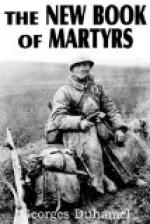In the evening he hands the thermometer. He helps the orderlies so much that he leaves them very little to do.
All this time the bones of his skull are at work under his bandages, and the red flesh is growing. But we are not to trouble about that: it will manage all alone. The man, however, cannot be idle. He works, and trusts to his blood, “which is healthy.”
In the evening, when the ward is lighted by a night-light, and I come in on tiptoe to give a last look round, I hear a voice laboriously spelling: “B-O, Bo; B-I, Bi; N-E, Ne, Bobine.” It is Mehay, learning to read before going to bed.
VI
A lamp has been left alight, because the men are not asleep yet, and they are allowed to smoke for a while. It would be no fun to smoke, unless one could see the smoke.
The former bedroom of the mistress of the house makes a very light, very clean ward. Under the draperies which have been fastened up to the ceiling and covered with sheets, old Louarn lies motionless, waiting for his three shattered limbs to mend. He is smoking a cigarette, the ash from which falls upon his breast. Apologising for the little heaps of dirt that make his bed the despair of the orderlies, he says to me:
“You know, a Breton ought to be a bit dirty.”
I touch the weight attached to his thigh, and he exclaims:
“Ma doue! Ma doue! Caste! Caste!”
These are oaths of a kind, of his own coining, which make every one laugh, and himself the first. He adds, as he does every day:
“Doctor, you never hurt me so much before as you have done this time.”
Then he laughs again.
Lens is not asleep yet, but he is as silent as usual. He has scarcely uttered twenty words in three weeks.
In a corner, Mehay patiently repeats: “P-A, Pa,” and the orderly who is teaching him to read presses his forefinger on the soiled page.
I make my way towards Croin, Octave. I sit down by the bed in silence.
Croin turns a face half hidden by bandages to me, and puts a leg damp with sweat out from under the blankets, for fever runs high just at this time. He too, is silent; he knows as well as I do that he is not going on well; but all the same, he hopes I shall go away without speaking to him.
No. I must tell him. I bend over him and murmur certain things.
He listens, and his chin begins to tremble, his boyish chin, which is covered with a soft, fair down.
Then, with the accent of his province, he says in a tearful, hesitating voice:
“I have already given an eye, must I give a hand too?”
His one remaining eye fills with tears. And seeing the sound hand, I press it gently before I go.
VII
When I put my fingers near his injured eye, Croin recoils a little.




